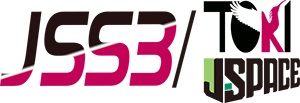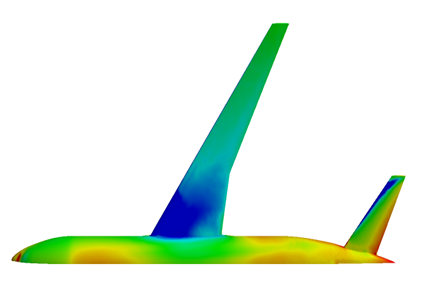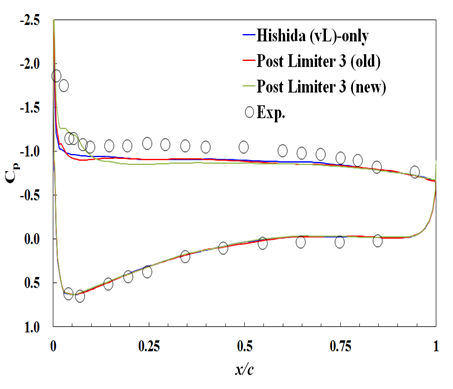Numerical Analysis of Low-Speed Buffet using High-Resolution Scheme
JAXA Supercomputer System Annual Report April 2017-March 2018
Report Number: R17EA1935
Subject Category: Aeronautical Technology
- Responsible Representative: Takashi AOYAMA, Aeronautical Technology Directorate, Numerical Simulation Research Unit
- Contact Information: Atsushi Hashimoto hashimoto.atsushi@jaxa.jp
- Members: Takuya Aogaki, Atsushi Hashimoto, Keiichi Kitamura, Kanta Fukumoto, Ayano Inatomi, Toshiaki Harada, Suguru Ogawa, Yuuya Takagi, Hiroyuki Takimoto, Hiroto Yaginuma
Abstract
Post Limiter has been improved to “Post Limiter 3(new)”, and incorporated into JAXA’s flow analysis code “FaSTAR.” Then, its performance has been demonstrated in several aerodynamic problems.
“Post Limiter 3(new)” and “HR-SLAU2” (numerical flux) are combined as a high-resolution scheme, for flow analysis of low-speed buffet around NASA-CRM aircraft. This combination successfully reproduced experimental data.
Reference URL
N/A
Reasons for using JSS2
Expensive computations are carried out.
In addition, one of our objectives was to confirm that the high-resolution “FaSTAR” (the present FaSTAR) successfully ran on JSS2.
Achievements of the Year
“Post Limiter 3 (new)” (Post Limiter 3 applied not only to primitive variables, but turbulent viscosity) has been incorporated into “FaSTAR” (JAXA’s flow analysis code), and its peformance has been demonstrated in several aerodynamic problems. Then, high resolution schemes “Post Limiter 3 (new)” and “HR-SLAU2” (numerical flux) are employed to resolve complex flow physics of low-speed buffet around aircraft (Fig.1). This combination successfully reproduced experimental data (Fig.2). These results have been published in Journal of Computational Physics and reported in conferences.
Publications
■ Peer-reviewed papers
1)Kitamura, K. and Hashimoto, A. “Simple a posteriori slope limiter (Post Limiter) for high resolution and efficient flow computations,” Journal of Computational Physics, Vol.341, 2017, pp. 313-340. doi:10.1016/j.jcp.2017.04.002.
2)Kitamura, K., Ogawa, S., and Takahama, T. “Aerodynamic Improvements of Airfoils at Low Reynolds Number
by Moving Surface Method,” JSASS Aerospace Technology Japan (in Japanese) (Accepted)
3)Kitamura, K., Aogaki, T., Inatomi, A., Fukumoto, K., Takahama, T., Hashimoto, A. “Post Limiters and Simple Dirty-Cell Detection for Three-Dimensional, Unstructured, (Unlimited) Aerodynamic Simulations,” AIAA Journal, (Under 2nd Review)
■ Presentations
1)Takabayashi, K., Fukumoto, K., and Kitamura, K.: Computational Study on Rigid Disk-Gap-Band Supersonic Parachute Aerodynamics, 31st International Symposium on Shock Waves (ISSW31), Nagoya, Japan, Jul. 9-14, 2017.
2)Kitamura, K., Aogaki, T., Hashimoto, A. “Extension of Post Limiter to 3D Unstructured Grids and Its Incorporation into FaSTAR,” ANSS2017, 2017, Tokyo.
3)Kitamura, K., Aogaki, T., Inatomi, A., Fukumoto, K., Takahama, T., Hashimoto, A. “Post Limiters and Simple Dirty-Cell Detection for 3D, Unstructured, (Unlimited) Aerodynamic Simulations,” AIAA Aviation 2018 (to be presented in Atlanta, USA)
Usage of JSS2
Computational Information
- Process Parallelization Methods: MPI
- Thread Parallelization Methods: N/A
- Number of Processes: 4 – 1024
- Elapsed Time per Case: 50.00 hours
Resources Used
Fraction of Usage in Total Resources*1(%): 0.99
Details
Please refer to System Configuration of JSS2 for the system configuration and major specifications of JSS2.
| System Name | Amount of Core Time(core x hours) | Fraction of Usage*2(%) |
|---|---|---|
| SORA-MA | 8,188,884.46 | 1.08 |
| SORA-PP | 7,011.75 | 0.09 |
| SORA-LM | 7,358.28 | 3.79 |
| SORA-TPP | 0.00 | 0.00 |
| File System Name | Storage Assigned(GiB) | Fraction of Usage*2(%) |
|---|---|---|
| /home | 064.90 | 0.04 |
| /data | 1,227.38 | 0.02 |
| /ltmp | 13,281.26 | 1.00 |
| Archiver Name | Storage Used(TiB) | Fraction of Usage*2(%) |
|---|---|---|
| J-SPACE | 8.89 | 0.38 |
*1: Fraction of Usage in Total Resources: Weighted average of three resource types (Computing, File System, and Archiver).
*2: Fraction of Usage:Percentage of usage relative to each resource used in one year.
JAXA Supercomputer System Annual Report April 2017-March 2018




